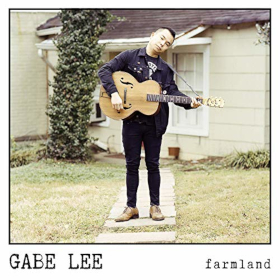Country Music Review: Gabe Lee’s “farmland” — The Whiskey-Tango-Foxtrot Blues
By Jeremy Ray Jewell
The music of this Nashvillian has a simple message for America: “You best pull yourself together, or you might never be the same.”

Get in your car, saddle up your pony, hop a train, hitch your way with a trucker, or sit yourself down on a Greyhound. Hell, just go out and talk to someone whom you never would have otherwise. Whatever you do, make sure you go out there and take a look at this here ‘America’ thing we got goin’ on… the ‘flyover’ states and all. And when you do, be sure to put on Gabe Lee‘s debut album farmland. It’s some hard traveling music, but sometimes we have to let the music remind us that some hard traveling is in order. And the music of this Nashvillian has a simple message for America: “You best pull yourself together, or you might never be the same.”
Lee introduces himself to us through a gathering of distinctive compositions, all of which display painfully profound compassion (and love) for the humanity of others. There’s also a passion for seeing folks get together and make the best of things. Lee’s poetic lyrics are reminiscent of those of John Prine, Blaze Foley, Townes Van Zandt, or even Tom Waits. Lee puts the suffering dregs of society center stage like few other contemporary songwriters. With the impulses of a folksinger and the swagger of a country outlaw, Lee’s songs feature double-wide trailers, prisons, criminality, addiction, desperation, conspiracy theories, Walmarts, pawnshops… and of course, love. But this isn’t mockery, fake humility, or slapdash ‘Americana’… This is just America – and Lee, who projects himself as a man of the people, seems to know this country very well. He takes us from Carolina to Frisco Bay, to “Arizona in better times,” on a grand tour of his “United States of Nowhere.” Along the way, he reminds us of a few simple, perennial truths which feel almost forgotten: people run their mouths, we’re all just trying to get by, and the open road is still open… as long as we put a foot in the door to keep it that way. Lee’s lyrics provide a very apt description of his own music: “Whiskey-Tango-Foxtrot blues” — WTF blues. What other kind of blues should we be singing today?
Lee is a fine picker and his songs on farmland come with equally fine accompaniment. Harmonica, piano, organ, dobro, steel guitar, backing vocals. His voice and overall sound at times recalls Dylan, at other times Mellencamp or Fogerty. Lee’s music is Country, but also equal parts ‘roots’ and ‘heartland.’ Some tracks lean on the somber side, while others are more soulful, or honky-tonky. Apparently, Lee has immersed himself in so much of the historical musical vernacular that he can bring it all back home without the slightest smack of irony or smidgeon of hokiness. As others have commented, there is a roughness and rawness to his music. Is it “retro”? Is it “front porch”? How ’bout we just call it down-home, y’all. Will it be exciting to see how his musical and wordsmithing talents develop in the future? Of course. But farmland isn’t any mere ‘first attempt.’ It’s a done deal.
At first, Lee’s music may sound deceptively straightforward, like the words. Relax and let Lee take over, and you’ll be surprised at where he takes you. Think you missed something? Well, he won’t repeat himself twice… so be ready to listen all over again. The music will stick in your head, and the words will stick to your ribs. They’re complex, but the flavor’s right. There’s “Alright OK”: “It only hurts for a while, it washes out in the rain.” Then there’s “Happy Trails”: “embracing the fault line you’re on.” And “United States of Nowhere”: “Big ol’ stack of leather Bibles blowin’ down the interstate.” Then there’s my personal favorite, “Ol’ Smokey,” which may be the most unexpectedly uplifting number on the album: “carryin’ on, voices ringin’ down the trailer walls” while “I ain’t heard a single word she’s said, ’cause the TV’s on, ol’ Smokey is losing again.” I’m going to go out on a limb and suggest that that’s a reference to Smokey and the Bandit … yes, a nod to the catharsis of the storytelling outlaws, the Jerry Reeds, the truck-driver tunes. Even if you don’t get the allusion, you know the feeling. For a moment, amid the mess of our lives, you are eastbound and down.
Lee is aware that drawing on weak nostalgia gets the job done, for today at least. It’ll hold us together for a minute, and sometimes that’s all you need to dream your dreams. And, though the American dream is supposedly dead, Lee proclaims:
That shit can wait until the mornin’
You ain’t got to be so sad
Won’t you come on out the cold dear
And tell me all the dreams you had.
This is clearly a singer-songwriter who is planting the seeds of human recognition, who wants to create a Country music that’s steeped in the lived experiences of its listeners, made up of songs that are unabashedly prepared to redeem them and their struggles from the dual vices of self-hatred and commercial idolatry. Redemption through hard traveling. Is there any other way? But travel we must. Gabe Lee’s farmland reminds us that we have no other home, no other place, no other land. We must wander this land until we may wander no more. It is here where we will reap what we have sown.
Jeremy Ray Jewell hails from Jacksonville, Florida. He has an MA in History of Ideas from Birkbeck College, University of London, and a BA in Philosophy from the University of Massachusetts Boston. His website is www.jeremyrayjewell.com, and he sometimes maintains a blog entitled That’s Not Southern Gothic.
